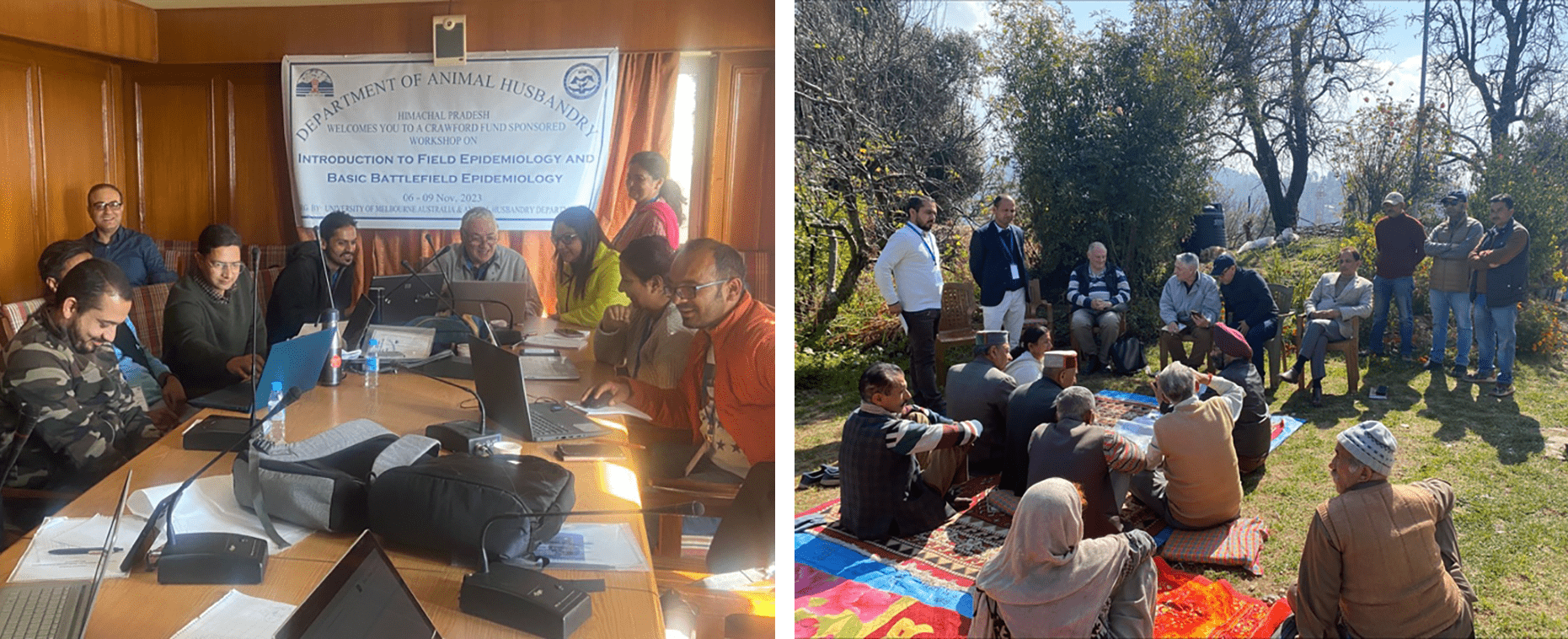

Shining LAMP on epidemiology and emergency management
February 8, 2024
The Crawford Fund’s Victoria Committee recently supported a training workshop jointly organised by the University of Melbourne, Agriculture Victoria, and the Department of Animal Husbandry, Shimla Himachal Pradesh in India.

Aimed at strengthening India-Australia ties and exploring further collaborations, the four-day training workshop, “Epidemiology and Emergency Management in Himachal Pradesh” included presentations by experts from Australia and India, laboratory training on LAMP (Loop-mediated isothermal amplification) testing for lumpy skin disease and a field visit on participatory epidemiology.
The team of delegates from Australia comprised of:
- Dr Surinder Chauhan, Director International, School of Agriculture and Food, The University of Melbourne
- Grant Rawlin, Research Leader, Veterinary Pathobiology, Agriculture Victoria
- Dr Roger Paskin, Animal Health Consultant, South Australia
- Dr Carl Justin, Veterinary Pathologist, Agriculture Victoria
Seventeen veterinarians with backgrounds in epidemiology, public health, pathology and microbiology were nominated for the training.
“The event highlighted the importance of international collaboration with interdisciplinary approach keeping in view the concept of One Health,” said Dr Surinder Chauhan.
Prof. Grant Rawlin presented how effective collaboration between Australia and Timor Leste in recent years, reported earlier here, and also supported by the Crawford Fund, has helped in improvement of surveillance, diagnostics thereby reducing mortality during outbreaks of African Swine Fever. He also highlighted that the international collaborations can mutually help veterinarians of both the countries through experiential learning opportunities.
“Potential areas of future collaboration like development of strategies for livestock farms, pasture management, pastoralist community empowerment, strengthening of laboratory infrastructure, field level diagnosis and interpersonal exchange between the two countries were also discussed,” said Dr Chauhan.
The training outcomes included:
- Better and improved learning on various epidemiological tools, steps in outbreak investigation and data analysis, descriptive statistics in epidemiology and practical on GIS based data analysis.
- That LAMP tests under field conditions not only save time in outbreak reporting but also help in early warning and initiating disease control and containment measures.
- Better learning and hands on experience in participatory rural appraisal in collecting epidemiological data in the field set up.
- Introduction to new software (Epicollect-5 & QGIS) in epidemiological data management and mapping.
Those involved identified that potential areas for future collaborations for the next five years could include: –
- Continuous interpersonal exchange between the two countries to promote experiential learning and training of LAMP test.
- Future collaborative research publications on the findings of laboratory and field- based diagnosis are expected.
- Exploring LAMP test techniques for other diseases.
- Developing strategies to improve management practices at government cattle and sheep breeding farms through active consultation services of the Australian experts. In this regard exposure visit to farms in Australia would be proposed.
- Evolving methods to mitigate various stress inducing factors during migration of flocks to improve production and health of small ruminants.
- Exploring the scope for establishing a complete supply chain for procuring, packaging and marketing meat of Himalayan breeds of goats and sheep.
- Developing techniques to improve pastures and ensure availability of green fodder year-round for farmers.
We look forward to seeing future developments!




